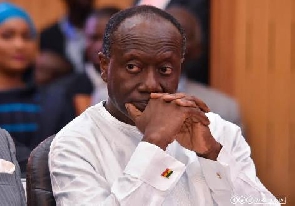The extension of Ghana’s programme with the International Monetary Fund (IMF) could spell doom for government’s ambitious initiatives, some economists fear.
They maintain that government’s hands could be tied since its spending would now be subject to the Fund’s scrutiny.
“The Fund would want assurances that all the ambitious programmes will not jeopardize the attainment of the ultimate objectives of the programme,” one economist told this paper.
The aims of the programme, among others, are to continue to cut the deficit and to bring down the debt to a more sustainable level.
These the Fund will resolutely ensure they are not jeopardized.
After several debates on whether or not the programme should be extended, government has finally communicated to the IMF its decision to extend the Fund's programme.
The programme would be extended to December 2018, instead of the initial completion date of March 2018, according to sources at the Fund.
The extension was one of the requirements before the IMF board meets next month to assess Ghana’s performance under the IMF programme, sources said.
The recent $21billion Chinese facility secured by Vice President, Dr Mahamudu Bawumia for Ghana is likely to come before the IMF for scrutinyl.
For analysts, the facility could be altered based on discussions between the Fund and government.
Again, with government’s spending budget, one of the programmes that readily comes up is its free Senior High School (SHS) policy set to take off in September this year.
About 1.6 million eligible students between the ages of 15-17 years across the country are expected to benefit from the policy.
Many, including the minority in Parliament have expressed misgivings about the sustainability of the programme, especially when government has revealed it will be funded from the country oil revenues.
But justifying the extension of the Fund’s programme with Ghana, analysts who spoke to this paper pointed out that the IMF programme was supposed to have a total of eight reviews. Ghana has so far seen only three reviews, with the fourth one still hanging.
It is only fair to extend the programme so the entire number of reviews could be carried out, the analysts maintained.
While the extension could afford government an opportunity to meet some of the critical targets set out in the programme, analysts are also confident it will signal investor confidence in the Ghanaian economy.
“It would be in the interest of government to extend the programme because of the signals it would send to investors about government commitment to stick to fiscal consolidation measures.” Economist Dr Joe Abbey explained.
Other benefits of the extension include an improvement in the country’s balance of payment position and therefore a welcome support for the local currency.
Government will have to carry on the fiscal consolidation exercise; meaning the tight budget spending stays unabated.
This means that government may not be able to complete numerous of its project promises captured in the manifesto until the programme is completed.
The Akufo-Addo led government has been keen on creating enough fiscal space to undertake growth projects and create jobs.
Government has said it is committed to undertaking reforms in revenue management, exemptions regime, statutory funds and removal of nuisance taxes to propel growth.
Some taxes have been removed completely removed with others have been reduced.
Ghana’s Gross Domestic Product will remain sluggish, if government’s growth agenda fails to materialize. The expected 6.5 percent growth forecast for 2017 will be driven mainly by the increase in oil production from the Tweneboa, Enyenra, Ntomme (TEN) oil field. Though the services, manufacturing and agriculture sectors will grow, it will be marginal.
For the Bank of Ghana (BoG) and its tabs on price stability, growth and interest rates, the Fund is also expected to urge the regulator to continue with its monitoring.
Since inflation is already trending downwards (12.6 per cent as at May), economists do not expect much from the Fund.
Business News of Thursday, 29 June 2017
Source: thefinderonline.com













